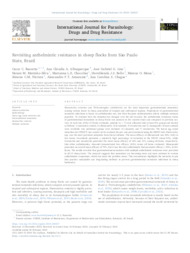Revisiting anthelmintic resistance in sheep flocks from São Paulo State, Brazil.
Revisiting anthelmintic resistance in sheep flocks from São Paulo State, Brazil.
Autoria: BASSETTO, C. C.; ALBUQUERQUE, A. C. A.; LINS, J. G. G.; SILVA, N. M. M.; CHOCOBAR, M. L. E.; BELLO, H. J. S.; MENA, M. O.; NICIURA, S. C. M.; AMARANTE, A. F. T.; CHAGAS, A. C. de S.
Resumo: Haemonchus contortus and Trichostrongylus colubriformis are the most important gastrointestinal nematodes causing serious losses in sheep production of tropical and subtropical regions. Prophylaxis of gastrointestinal nematode infections is based on anthelmintics use, but their frequent administration selects multiple-resistant parasites. To evaluate how the situation has changed over the last decades, the anthelmintic resistance status of gastrointestinal nematodes in sheep flocks was assessed in the current study and compared to previous surveys. In each one of the 15 flocks evaluated, animals (n ? 7) were allocated into at least five groups and treated as follows: 1) untreated control; 2) albendazole; 3) levamisole; 4) ivermectin; and 5) monepantel. If more animals were available, two additional groups were included: 6) closantel, and 7) moxidectin. The faecal egg count reduction test (FECRT) was carried out to evaluate the pre- and post-treatment using the SHINY tool. Haemonchus spp. was the most prevalent nematode from faecal cultures. The mean efficacy of albendazole was 40%. Only in two farms, levamisole presented a relatively high percentage of reduction in the FECRT about 90%, while ivermectin and moxidectin presented the worst mean efficacy of 34% and 21% among all farms, respectively. Like other anthelmintics, closantel demonstrated low efficacy (63%) across all farms evaluated. Monepantel presented an overall mean efficacy of 79%, but it was the only anthelmintic that presented efficacy ?95%, in five farms. The results revealed that gastrointestinal nematodes with multiple anthelmintic resistance were prevalent in all 15 sheep herds. The research suggests that nematodes are becoming more and more resistant to various anthelmintic compounds, which has made the problem worse. This circumstance highlights the necessity to put into practice sustainable and long-lasting methods to prevent gastrointestinal nematode infections in sheep husbandry.
Ano de publicação: 2024
Tipo de publicação: Artigo de periódico
Unidade: Embrapa Pecuária Sudeste
Palavras-chave: Faecal egg count reduction test, Haemonchus Contortus, Multiple resistance
Observações
1 - Por padrão são exibidas publicações dos últimos 20 anos. Para encontrar publicações mais antigas, configure o filtro ano de publicação, colocando o ano a partir do qual você deseja encontrar publicações. O filtro está na coluna da esquerda na busca acima.
2 - Para ler algumas publicações da Embrapa (apenas as que estão em formato ePub), é necessário ter, no celular ou computador, um desses softwares gratuitos. Sistemas Android: Google Play Livros; IOS: iBooks; Windows e Linux: software Calibre.
Acesse outras publicações
Acesse a Base de Dados da Pesquisa Agropecuária (BDPA) para consultar o acervo completo das bibliotecas da Embrapa.

